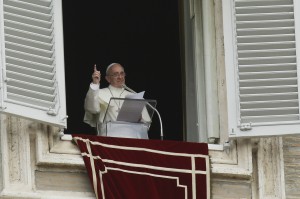PARIS – Five minutes. That’s all it took to make papal history.
Never has a leader of the Roman Catholic Church become as popular in as short a time as Pope Francis did when he humbly asked the crowd gathered in St. Peter’s Square on March 13 last year to pray for him.
A year on, Francis, known for his gentle smile and infectious energy, has won over hearts worldwide. Admirers from Manila to Mexico fondly remember his first appearance on the balcony in the Vatican when he began with the simple greeting, “Good evening.”
Maria Angelica Largo, a 50-year-old from Colombia, said she “immediately felt he was closer to the people, more simple and more human.”
“We have never seen a pope become so popular in just a couple of minutes,” said Odon Vallet, a French historian and an expert on religion.
The Argentine-born pope’s humble and homespun style – he likes to mingle with the crowds – also bowled over Roger Kouassi, a teacher in the west African country of Ivory Coast for whom the main thing is that “Francis is closer to the people.”
On Twitter too, the 77-year-old pontiff has built up a following of millions of people and his messages are re-tweeted more than those of tech-savvy US President Barack Obama.
Francis became the first non-European pope in nearly 1,300 years when he was elected by the College of Cardinals a year ago Thursday to succeed Benedict XVI, who chose to retire and is now pope emeritus.
Over the past year, Francis has won accolades and plaudits for powerful gestures such as washing the feet of young Muslim inmates, embracing the handicapped and asking that gay people not be judged.
Being Catholic is ‘in’
In France, where only three percent of Catholics are identified as practicing their religion, priests say there has been an increase in church attendance since Pope Francis’s election.
“Before it was ‘uncool’ to be Catholic, now it’s ‘in’,” said Vallet.
Still the man who was born Jorge Mario Bergoglio has to walk a tight rope in his papacy.
Among his challenges are the thorny issues of marriage for priests and overhauling the Vatican’s coffers after a string of scandals, including allegations of waste, corruption and even money-laundering.
And the world’s 1.2 billion Catholics are grappling with sensitive and often divisive issues, such as homosexuality and abortion.
In comments that made waves around the world, Francis last July famously asked: “If someone is gay and seeks the Lord with good will, who am I to judge?”
Gay rights groups cautiously welcomed the words as a change in tone, but warned they did not reflect a shift in Catholic Church policy – and certainly not a move towards accepting same-sex marriage.
“If homosexuals want to marry, they can do so in a civil ceremony but we cannot change the Church of Christ to suit one’s tastes,” said Aurora Gomez, a Catholic in Mexico.
On the other side of the Pacific in the world’s fourth largest Catholic country, Filipino Nona Andaya-Castillo said she would back moves to ease Church policies on homosexuality.
But living in one of the few countries where abortion is still illegal, the 52-year-old added she opposed any moves to soften the Church’s stance on that issue.
Although no one has expected Francis to make radical changes in doctrine, the pope has shown a willingness to encourage greater understanding and pastoral care of Christians who are divorced, single mothers, or homosexuals.
“The simple humanity of Francis has worked its charm,” said Gilda Rey, a Catholic from the southern French city of Toulouse.
“He doesn’t hesitate to mingle with the crowds or even celebrate Saint Valentine’s Day. He’s a very fraternal pope.”
